ENTR101 - Entrepreneurship and Small Business Report: Venture Types
VerifiedAdded on 2022/03/28
|27
|7534
|21
Report
AI Summary
This report delves into the multifaceted world of entrepreneurship, examining diverse venture types and their significance. It begins by defining entrepreneurship and exploring entrepreneurial activities, including the role of risk-taking and innovation. The report then categorizes and analyzes different types of entrepreneurial ventures, such as micro/small organizations, medium-sized organizations, and large enterprises, providing examples like Hakim Group, Vodafone Group, and Unilever. It further explores the similarities and differences between various venture types, including small businesses, lifestyle ventures, social good organizations, large enterprises, and scalable startups. The report highlights the importance of revenue generation and marketing strategies across different organizational structures, contributing to a comprehensive understanding of the entrepreneurial landscape and its impact on the UK economy.

Entrepreneurship and Small Business
Management
1
Management
1
Paraphrase This Document
Need a fresh take? Get an instant paraphrase of this document with our AI Paraphraser

TABLE OF CONTENT
Abstract………………………………………………………………..page3
Introduction…………………………………………………………….page4
Task 1
P1…………………………………………………………………………page5-8
P2…………………………………………………………………………page8-12
Task2
P3…………………………………………………………………………page12-14
P4…………………………………………………………………………page15-17
Task 3
P5……………………………………………………………………….....page17-20
P6……………………………………………………………………….....page20-22
Task 4
P7……………………………………………………………………….....page23-24
Conclusion……………………………………………………………....page25
References……………………………………………………………….page
2
Abstract………………………………………………………………..page3
Introduction…………………………………………………………….page4
Task 1
P1…………………………………………………………………………page5-8
P2…………………………………………………………………………page8-12
Task2
P3…………………………………………………………………………page12-14
P4…………………………………………………………………………page15-17
Task 3
P5……………………………………………………………………….....page17-20
P6……………………………………………………………………….....page20-22
Task 4
P7……………………………………………………………………….....page23-24
Conclusion……………………………………………………………....page25
References……………………………………………………………….page
2
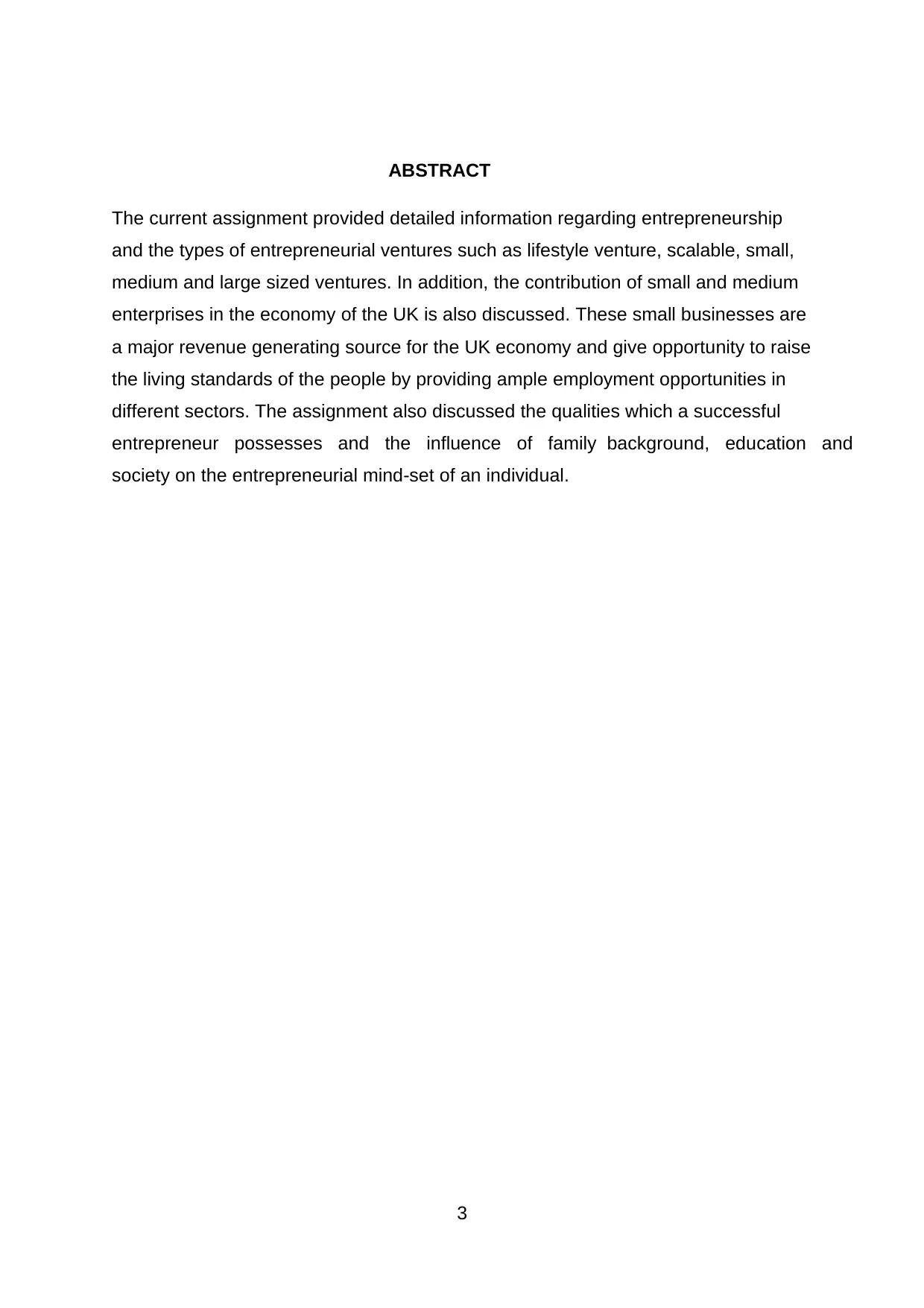
ABSTRACT
The current assignment provided detailed information regarding entrepreneurship
and the types of entrepreneurial ventures such as lifestyle venture, scalable, small,
medium and large sized ventures. In addition, the contribution of small and medium
enterprises in the economy of the UK is also discussed. These small businesses are
a major revenue generating source for the UK economy and give opportunity to raise
the living standards of the people by providing ample employment opportunities in
different sectors. The assignment also discussed the qualities which a successful
entrepreneur possesses and the influence of family background, education and
society on the entrepreneurial mind-set of an individual.
3
The current assignment provided detailed information regarding entrepreneurship
and the types of entrepreneurial ventures such as lifestyle venture, scalable, small,
medium and large sized ventures. In addition, the contribution of small and medium
enterprises in the economy of the UK is also discussed. These small businesses are
a major revenue generating source for the UK economy and give opportunity to raise
the living standards of the people by providing ample employment opportunities in
different sectors. The assignment also discussed the qualities which a successful
entrepreneur possesses and the influence of family background, education and
society on the entrepreneurial mind-set of an individual.
3
⊘ This is a preview!⊘
Do you want full access?
Subscribe today to unlock all pages.

Trusted by 1+ million students worldwide
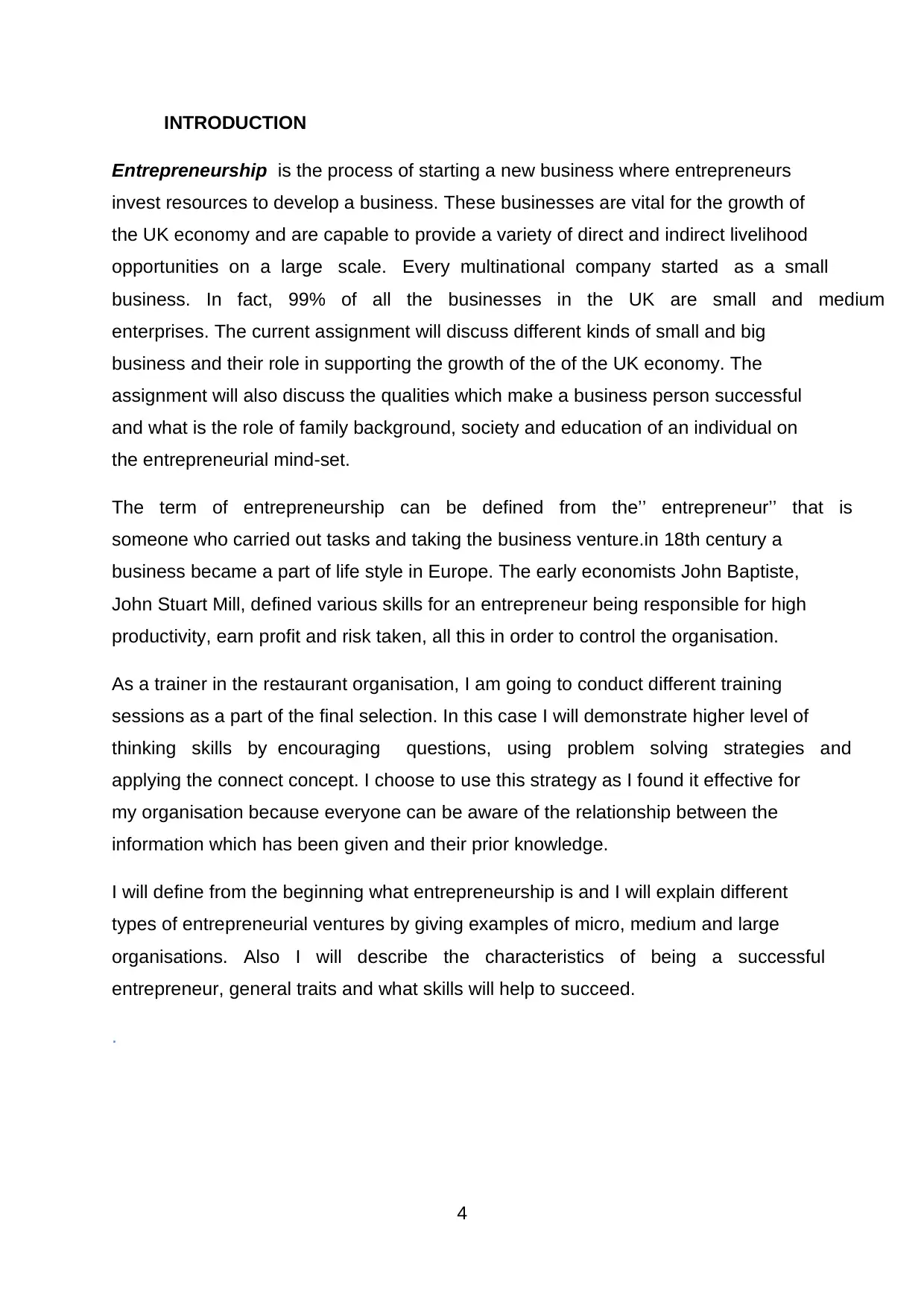
INTRODUCTION
Entrepreneurship is the process of starting a new business where entrepreneurs
invest resources to develop a business. These businesses are vital for the growth of
the UK economy and are capable to provide a variety of direct and indirect livelihood
opportunities on a large scale. Every multinational company started as a small
business. In fact, 99% of all the businesses in the UK are small and medium
enterprises. The current assignment will discuss different kinds of small and big
business and their role in supporting the growth of the of the UK economy. The
assignment will also discuss the qualities which make a business person successful
and what is the role of family background, society and education of an individual on
the entrepreneurial mind-set.
The term of entrepreneurship can be defined from the’’ entrepreneur’’ that is
someone who carried out tasks and taking the business venture.in 18th century a
business became a part of life style in Europe. The early economists John Baptiste,
John Stuart Mill, defined various skills for an entrepreneur being responsible for high
productivity, earn profit and risk taken, all this in order to control the organisation.
As a trainer in the restaurant organisation, I am going to conduct different training
sessions as a part of the final selection. In this case I will demonstrate higher level of
thinking skills by encouraging questions, using problem solving strategies and
applying the connect concept. I choose to use this strategy as I found it effective for
my organisation because everyone can be aware of the relationship between the
information which has been given and their prior knowledge.
I will define from the beginning what entrepreneurship is and I will explain different
types of entrepreneurial ventures by giving examples of micro, medium and large
organisations. Also I will describe the characteristics of being a successful
entrepreneur, general traits and what skills will help to succeed.
.
4
Entrepreneurship is the process of starting a new business where entrepreneurs
invest resources to develop a business. These businesses are vital for the growth of
the UK economy and are capable to provide a variety of direct and indirect livelihood
opportunities on a large scale. Every multinational company started as a small
business. In fact, 99% of all the businesses in the UK are small and medium
enterprises. The current assignment will discuss different kinds of small and big
business and their role in supporting the growth of the of the UK economy. The
assignment will also discuss the qualities which make a business person successful
and what is the role of family background, society and education of an individual on
the entrepreneurial mind-set.
The term of entrepreneurship can be defined from the’’ entrepreneur’’ that is
someone who carried out tasks and taking the business venture.in 18th century a
business became a part of life style in Europe. The early economists John Baptiste,
John Stuart Mill, defined various skills for an entrepreneur being responsible for high
productivity, earn profit and risk taken, all this in order to control the organisation.
As a trainer in the restaurant organisation, I am going to conduct different training
sessions as a part of the final selection. In this case I will demonstrate higher level of
thinking skills by encouraging questions, using problem solving strategies and
applying the connect concept. I choose to use this strategy as I found it effective for
my organisation because everyone can be aware of the relationship between the
information which has been given and their prior knowledge.
I will define from the beginning what entrepreneurship is and I will explain different
types of entrepreneurial ventures by giving examples of micro, medium and large
organisations. Also I will describe the characteristics of being a successful
entrepreneur, general traits and what skills will help to succeed.
.
4
Paraphrase This Document
Need a fresh take? Get an instant paraphrase of this document with our AI Paraphraser
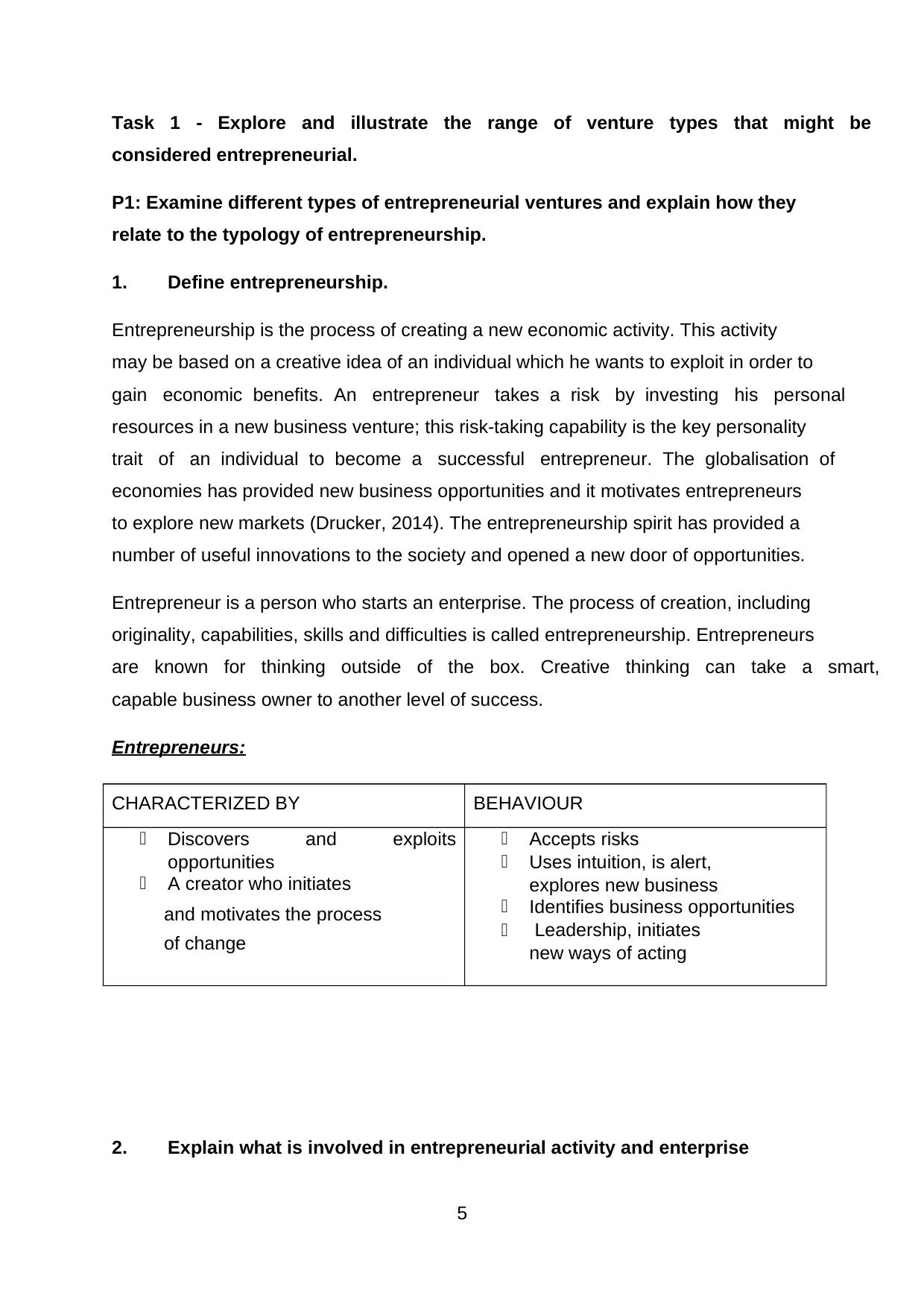
Task 1 - Explore and illustrate the range of venture types that might be
considered entrepreneurial.
P1: Examine different types of entrepreneurial ventures and explain how they
relate to the typology of entrepreneurship.
1. Define entrepreneurship.
Entrepreneurship is the process of creating a new economic activity. This activity
may be based on a creative idea of an individual which he wants to exploit in order to
gain economic benefits. An entrepreneur takes a risk by investing his personal
resources in a new business venture; this risk-taking capability is the key personality
trait of an individual to become a successful entrepreneur. The globalisation of
economies has provided new business opportunities and it motivates entrepreneurs
to explore new markets (Drucker, 2014). The entrepreneurship spirit has provided a
number of useful innovations to the society and opened a new door of opportunities.
Entrepreneur is a person who starts an enterprise. The process of creation, including
originality, capabilities, skills and difficulties is called entrepreneurship. Entrepreneurs
are known for thinking outside of the box. Creative thinking can take a smart,
capable business owner to another level of success.
Entrepreneurs:
CHARACTERIZED BY BEHAVIOUR
Discovers and exploits
opportunities
A creator who initiates
and motivates the process
of change
Accepts risks
Uses intuition, is alert,
explores new business
Identifies business opportunities
Leadership, initiates
new ways of acting
2. Explain what is involved in entrepreneurial activity and enterprise
5
considered entrepreneurial.
P1: Examine different types of entrepreneurial ventures and explain how they
relate to the typology of entrepreneurship.
1. Define entrepreneurship.
Entrepreneurship is the process of creating a new economic activity. This activity
may be based on a creative idea of an individual which he wants to exploit in order to
gain economic benefits. An entrepreneur takes a risk by investing his personal
resources in a new business venture; this risk-taking capability is the key personality
trait of an individual to become a successful entrepreneur. The globalisation of
economies has provided new business opportunities and it motivates entrepreneurs
to explore new markets (Drucker, 2014). The entrepreneurship spirit has provided a
number of useful innovations to the society and opened a new door of opportunities.
Entrepreneur is a person who starts an enterprise. The process of creation, including
originality, capabilities, skills and difficulties is called entrepreneurship. Entrepreneurs
are known for thinking outside of the box. Creative thinking can take a smart,
capable business owner to another level of success.
Entrepreneurs:
CHARACTERIZED BY BEHAVIOUR
Discovers and exploits
opportunities
A creator who initiates
and motivates the process
of change
Accepts risks
Uses intuition, is alert,
explores new business
Identifies business opportunities
Leadership, initiates
new ways of acting
2. Explain what is involved in entrepreneurial activity and enterprise
5
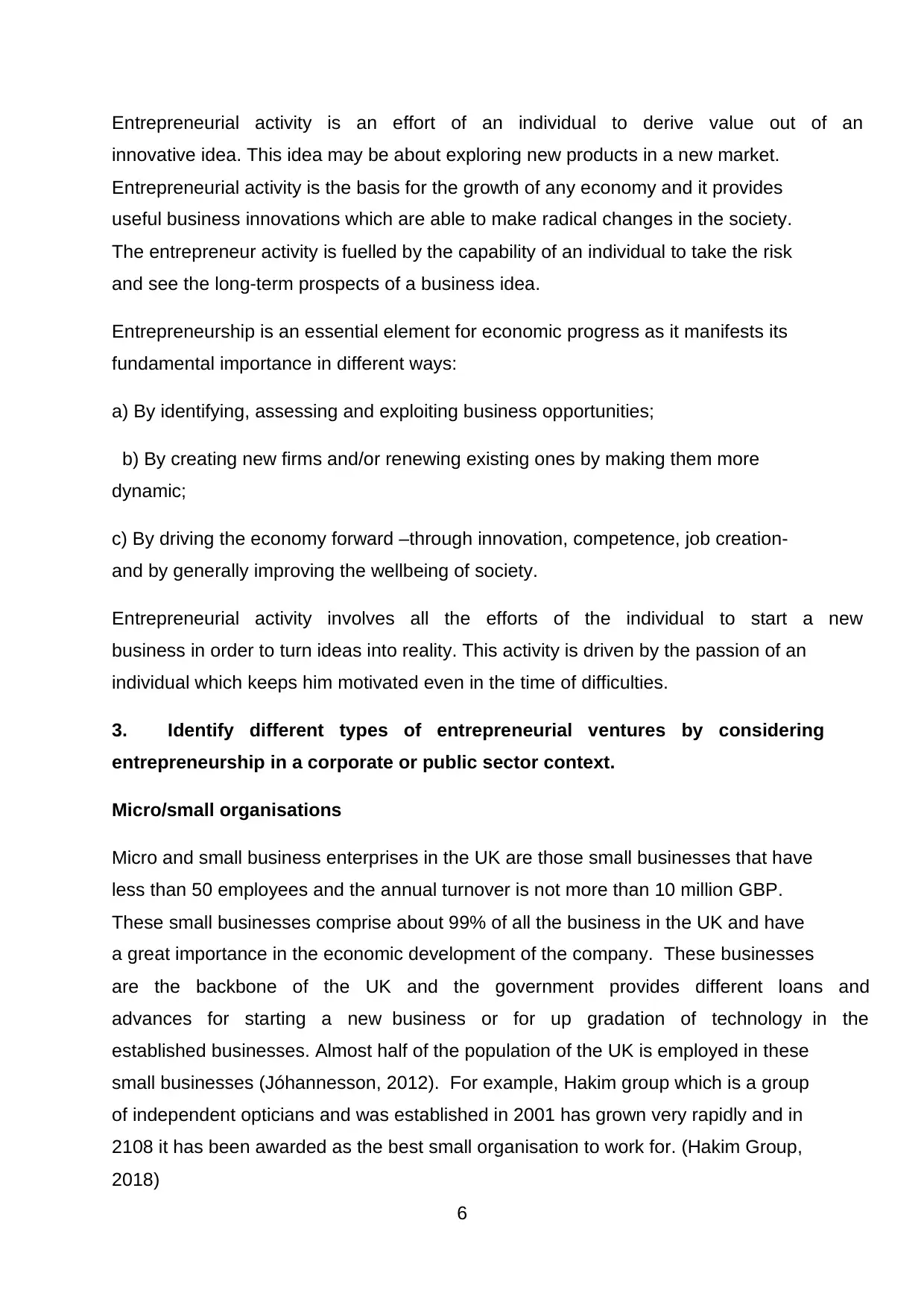
Entrepreneurial activity is an effort of an individual to derive value out of an
innovative idea. This idea may be about exploring new products in a new market.
Entrepreneurial activity is the basis for the growth of any economy and it provides
useful business innovations which are able to make radical changes in the society.
The entrepreneur activity is fuelled by the capability of an individual to take the risk
and see the long-term prospects of a business idea.
Entrepreneurship is an essential element for economic progress as it manifests its
fundamental importance in different ways:
a) By identifying, assessing and exploiting business opportunities;
b) By creating new firms and/or renewing existing ones by making them more
dynamic;
c) By driving the economy forward –through innovation, competence, job creation-
and by generally improving the wellbeing of society.
Entrepreneurial activity involves all the efforts of the individual to start a new
business in order to turn ideas into reality. This activity is driven by the passion of an
individual which keeps him motivated even in the time of difficulties.
3. Identify different types of entrepreneurial ventures by considering
entrepreneurship in a corporate or public sector context.
Micro/small organisations
Micro and small business enterprises in the UK are those small businesses that have
less than 50 employees and the annual turnover is not more than 10 million GBP.
These small businesses comprise about 99% of all the business in the UK and have
a great importance in the economic development of the company. These businesses
are the backbone of the UK and the government provides different loans and
advances for starting a new business or for up gradation of technology in the
established businesses. Almost half of the population of the UK is employed in these
small businesses (Jóhannesson, 2012). For example, Hakim group which is a group
of independent opticians and was established in 2001 has grown very rapidly and in
2108 it has been awarded as the best small organisation to work for. (Hakim Group,
2018)
6
innovative idea. This idea may be about exploring new products in a new market.
Entrepreneurial activity is the basis for the growth of any economy and it provides
useful business innovations which are able to make radical changes in the society.
The entrepreneur activity is fuelled by the capability of an individual to take the risk
and see the long-term prospects of a business idea.
Entrepreneurship is an essential element for economic progress as it manifests its
fundamental importance in different ways:
a) By identifying, assessing and exploiting business opportunities;
b) By creating new firms and/or renewing existing ones by making them more
dynamic;
c) By driving the economy forward –through innovation, competence, job creation-
and by generally improving the wellbeing of society.
Entrepreneurial activity involves all the efforts of the individual to start a new
business in order to turn ideas into reality. This activity is driven by the passion of an
individual which keeps him motivated even in the time of difficulties.
3. Identify different types of entrepreneurial ventures by considering
entrepreneurship in a corporate or public sector context.
Micro/small organisations
Micro and small business enterprises in the UK are those small businesses that have
less than 50 employees and the annual turnover is not more than 10 million GBP.
These small businesses comprise about 99% of all the business in the UK and have
a great importance in the economic development of the company. These businesses
are the backbone of the UK and the government provides different loans and
advances for starting a new business or for up gradation of technology in the
established businesses. Almost half of the population of the UK is employed in these
small businesses (Jóhannesson, 2012). For example, Hakim group which is a group
of independent opticians and was established in 2001 has grown very rapidly and in
2108 it has been awarded as the best small organisation to work for. (Hakim Group,
2018)
6
⊘ This is a preview!⊘
Do you want full access?
Subscribe today to unlock all pages.

Trusted by 1+ million students worldwide
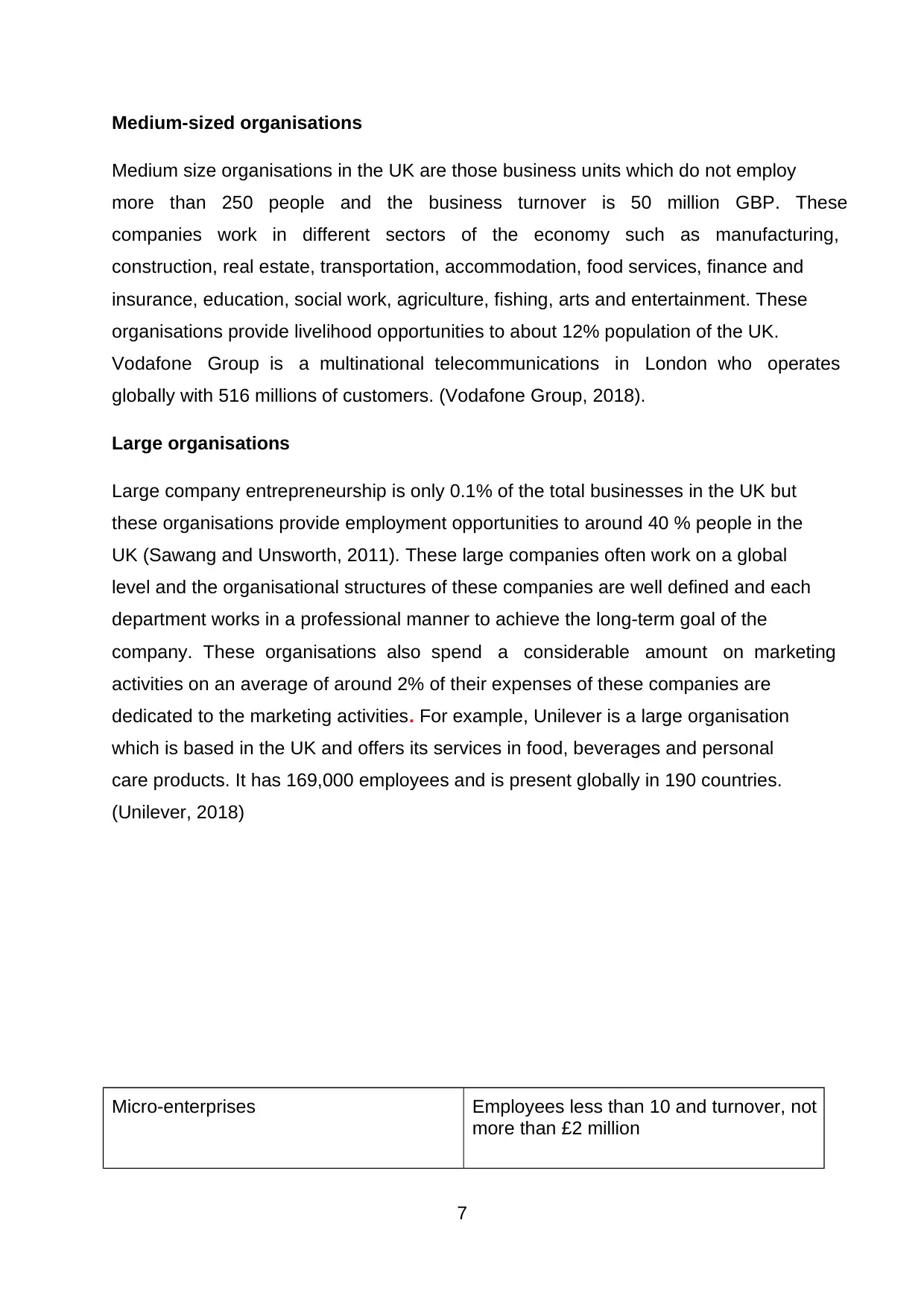
Medium-sized organisations
Medium size organisations in the UK are those business units which do not employ
more than 250 people and the business turnover is 50 million GBP. These
companies work in different sectors of the economy such as manufacturing,
construction, real estate, transportation, accommodation, food services, finance and
insurance, education, social work, agriculture, fishing, arts and entertainment. These
organisations provide livelihood opportunities to about 12% population of the UK.
Vodafone Group is a multinational telecommunications in London who operates
globally with 516 millions of customers. (Vodafone Group, 2018).
Large organisations
Large company entrepreneurship is only 0.1% of the total businesses in the UK but
these organisations provide employment opportunities to around 40 % people in the
UK (Sawang and Unsworth, 2011). These large companies often work on a global
level and the organisational structures of these companies are well defined and each
department works in a professional manner to achieve the long-term goal of the
company. These organisations also spend a considerable amount on marketing
activities on an average of around 2% of their expenses of these companies are
dedicated to the marketing activities. For example, Unilever is a large organisation
which is based in the UK and offers its services in food, beverages and personal
care products. It has 169,000 employees and is present globally in 190 countries.
(Unilever, 2018)
Micro-enterprises Employees less than 10 and turnover, not
more than £2 million
7
Medium size organisations in the UK are those business units which do not employ
more than 250 people and the business turnover is 50 million GBP. These
companies work in different sectors of the economy such as manufacturing,
construction, real estate, transportation, accommodation, food services, finance and
insurance, education, social work, agriculture, fishing, arts and entertainment. These
organisations provide livelihood opportunities to about 12% population of the UK.
Vodafone Group is a multinational telecommunications in London who operates
globally with 516 millions of customers. (Vodafone Group, 2018).
Large organisations
Large company entrepreneurship is only 0.1% of the total businesses in the UK but
these organisations provide employment opportunities to around 40 % people in the
UK (Sawang and Unsworth, 2011). These large companies often work on a global
level and the organisational structures of these companies are well defined and each
department works in a professional manner to achieve the long-term goal of the
company. These organisations also spend a considerable amount on marketing
activities on an average of around 2% of their expenses of these companies are
dedicated to the marketing activities. For example, Unilever is a large organisation
which is based in the UK and offers its services in food, beverages and personal
care products. It has 169,000 employees and is present globally in 190 countries.
(Unilever, 2018)
Micro-enterprises Employees less than 10 and turnover, not
more than £2 million
7
Paraphrase This Document
Need a fresh take? Get an instant paraphrase of this document with our AI Paraphraser
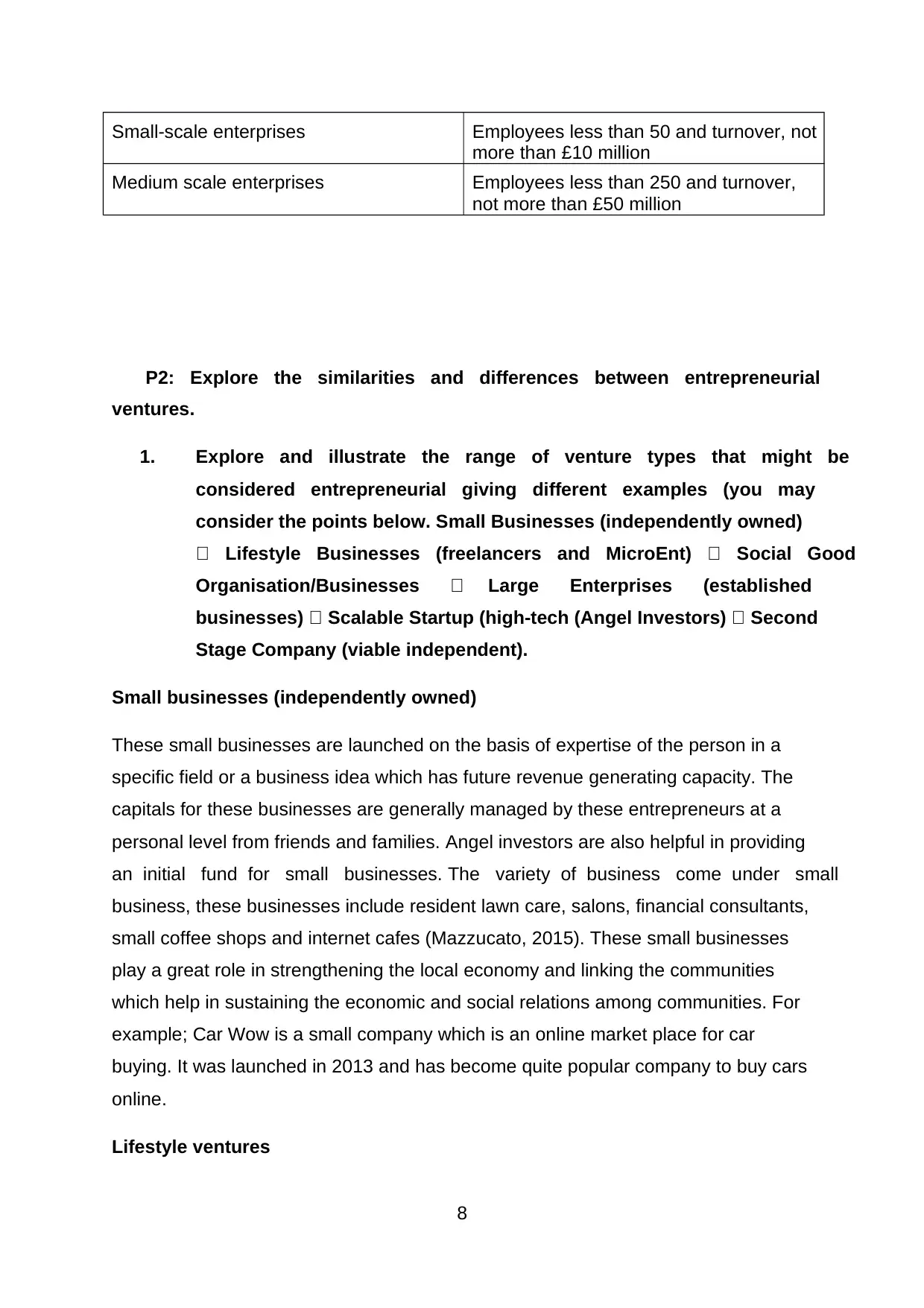
Small-scale enterprises Employees less than 50 and turnover, not
more than £10 million
Medium scale enterprises Employees less than 250 and turnover,
not more than £50 million
P2: Explore the similarities and differences between entrepreneurial
ventures.
1. Explore and illustrate the range of venture types that might be
considered entrepreneurial giving different examples (you may
consider the points below. Small Businesses (independently owned)
Lifestyle Businesses (freelancers and MicroEnt) Social Good
Organisation/Businesses Large Enterprises (established
businesses) Scalable Startup (high-tech (Angel Investors) Second
Stage Company (viable independent).
Small businesses (independently owned)
These small businesses are launched on the basis of expertise of the person in a
specific field or a business idea which has future revenue generating capacity. The
capitals for these businesses are generally managed by these entrepreneurs at a
personal level from friends and families. Angel investors are also helpful in providing
an initial fund for small businesses. The variety of business come under small
business, these businesses include resident lawn care, salons, financial consultants,
small coffee shops and internet cafes (Mazzucato, 2015). These small businesses
play a great role in strengthening the local economy and linking the communities
which help in sustaining the economic and social relations among communities. For
example; Car Wow is a small company which is an online market place for car
buying. It was launched in 2013 and has become quite popular company to buy cars
online.
Lifestyle ventures
8
more than £10 million
Medium scale enterprises Employees less than 250 and turnover,
not more than £50 million
P2: Explore the similarities and differences between entrepreneurial
ventures.
1. Explore and illustrate the range of venture types that might be
considered entrepreneurial giving different examples (you may
consider the points below. Small Businesses (independently owned)
Lifestyle Businesses (freelancers and MicroEnt) Social Good
Organisation/Businesses Large Enterprises (established
businesses) Scalable Startup (high-tech (Angel Investors) Second
Stage Company (viable independent).
Small businesses (independently owned)
These small businesses are launched on the basis of expertise of the person in a
specific field or a business idea which has future revenue generating capacity. The
capitals for these businesses are generally managed by these entrepreneurs at a
personal level from friends and families. Angel investors are also helpful in providing
an initial fund for small businesses. The variety of business come under small
business, these businesses include resident lawn care, salons, financial consultants,
small coffee shops and internet cafes (Mazzucato, 2015). These small businesses
play a great role in strengthening the local economy and linking the communities
which help in sustaining the economic and social relations among communities. For
example; Car Wow is a small company which is an online market place for car
buying. It was launched in 2013 and has become quite popular company to buy cars
online.
Lifestyle ventures
8
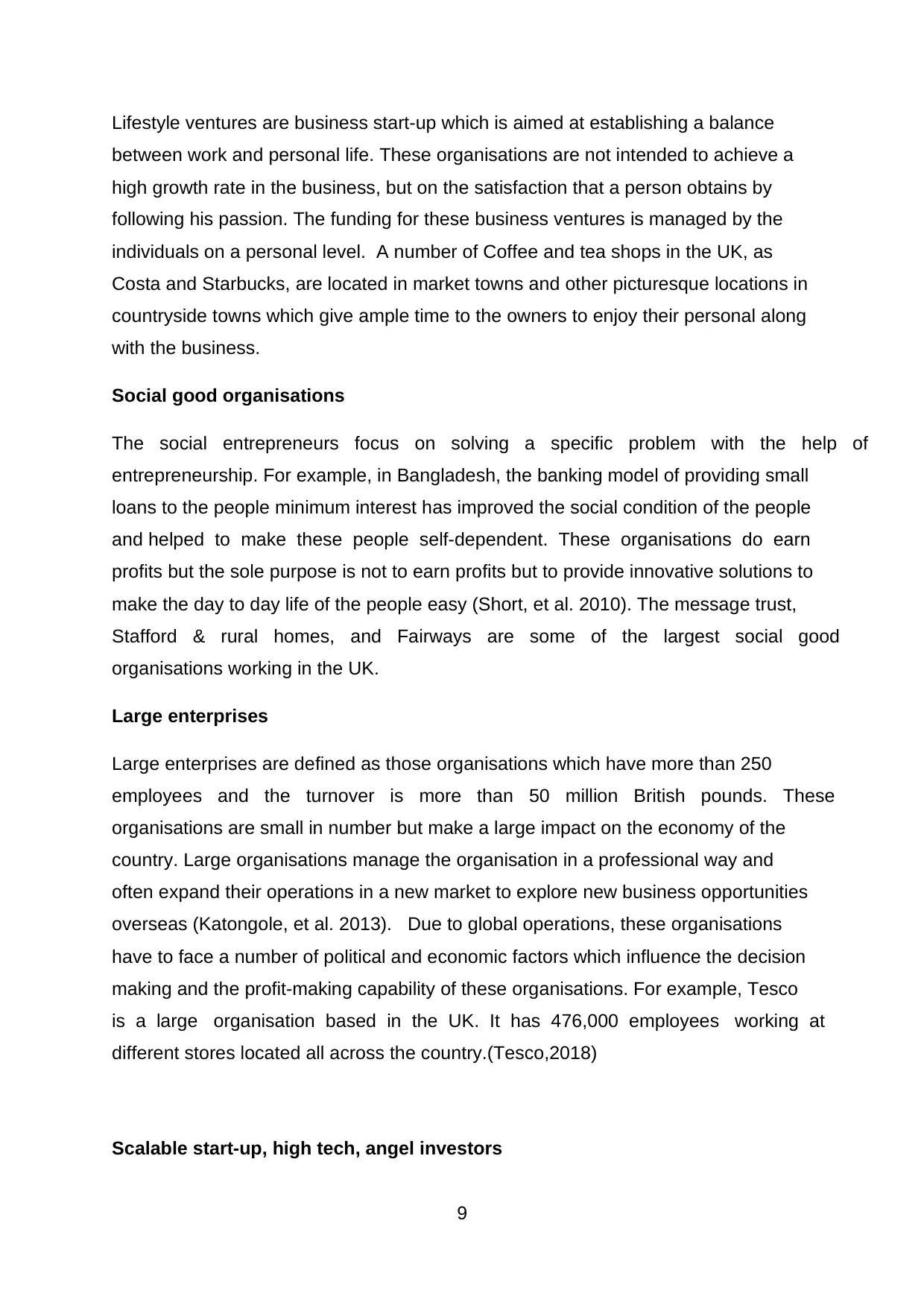
Lifestyle ventures are business start-up which is aimed at establishing a balance
between work and personal life. These organisations are not intended to achieve a
high growth rate in the business, but on the satisfaction that a person obtains by
following his passion. The funding for these business ventures is managed by the
individuals on a personal level. A number of Coffee and tea shops in the UK, as
Costa and Starbucks, are located in market towns and other picturesque locations in
countryside towns which give ample time to the owners to enjoy their personal along
with the business.
Social good organisations
The social entrepreneurs focus on solving a specific problem with the help of
entrepreneurship. For example, in Bangladesh, the banking model of providing small
loans to the people minimum interest has improved the social condition of the people
and helped to make these people self-dependent. These organisations do earn
profits but the sole purpose is not to earn profits but to provide innovative solutions to
make the day to day life of the people easy (Short, et al. 2010). The message trust,
Stafford & rural homes, and Fairways are some of the largest social good
organisations working in the UK.
Large enterprises
Large enterprises are defined as those organisations which have more than 250
employees and the turnover is more than 50 million British pounds. These
organisations are small in number but make a large impact on the economy of the
country. Large organisations manage the organisation in a professional way and
often expand their operations in a new market to explore new business opportunities
overseas (Katongole, et al. 2013). Due to global operations, these organisations
have to face a number of political and economic factors which influence the decision
making and the profit-making capability of these organisations. For example, Tesco
is a large organisation based in the UK. It has 476,000 employees working at
different stores located all across the country.(Tesco,2018)
Scalable start-up, high tech, angel investors
9
between work and personal life. These organisations are not intended to achieve a
high growth rate in the business, but on the satisfaction that a person obtains by
following his passion. The funding for these business ventures is managed by the
individuals on a personal level. A number of Coffee and tea shops in the UK, as
Costa and Starbucks, are located in market towns and other picturesque locations in
countryside towns which give ample time to the owners to enjoy their personal along
with the business.
Social good organisations
The social entrepreneurs focus on solving a specific problem with the help of
entrepreneurship. For example, in Bangladesh, the banking model of providing small
loans to the people minimum interest has improved the social condition of the people
and helped to make these people self-dependent. These organisations do earn
profits but the sole purpose is not to earn profits but to provide innovative solutions to
make the day to day life of the people easy (Short, et al. 2010). The message trust,
Stafford & rural homes, and Fairways are some of the largest social good
organisations working in the UK.
Large enterprises
Large enterprises are defined as those organisations which have more than 250
employees and the turnover is more than 50 million British pounds. These
organisations are small in number but make a large impact on the economy of the
country. Large organisations manage the organisation in a professional way and
often expand their operations in a new market to explore new business opportunities
overseas (Katongole, et al. 2013). Due to global operations, these organisations
have to face a number of political and economic factors which influence the decision
making and the profit-making capability of these organisations. For example, Tesco
is a large organisation based in the UK. It has 476,000 employees working at
different stores located all across the country.(Tesco,2018)
Scalable start-up, high tech, angel investors
9
⊘ This is a preview!⊘
Do you want full access?
Subscribe today to unlock all pages.

Trusted by 1+ million students worldwide
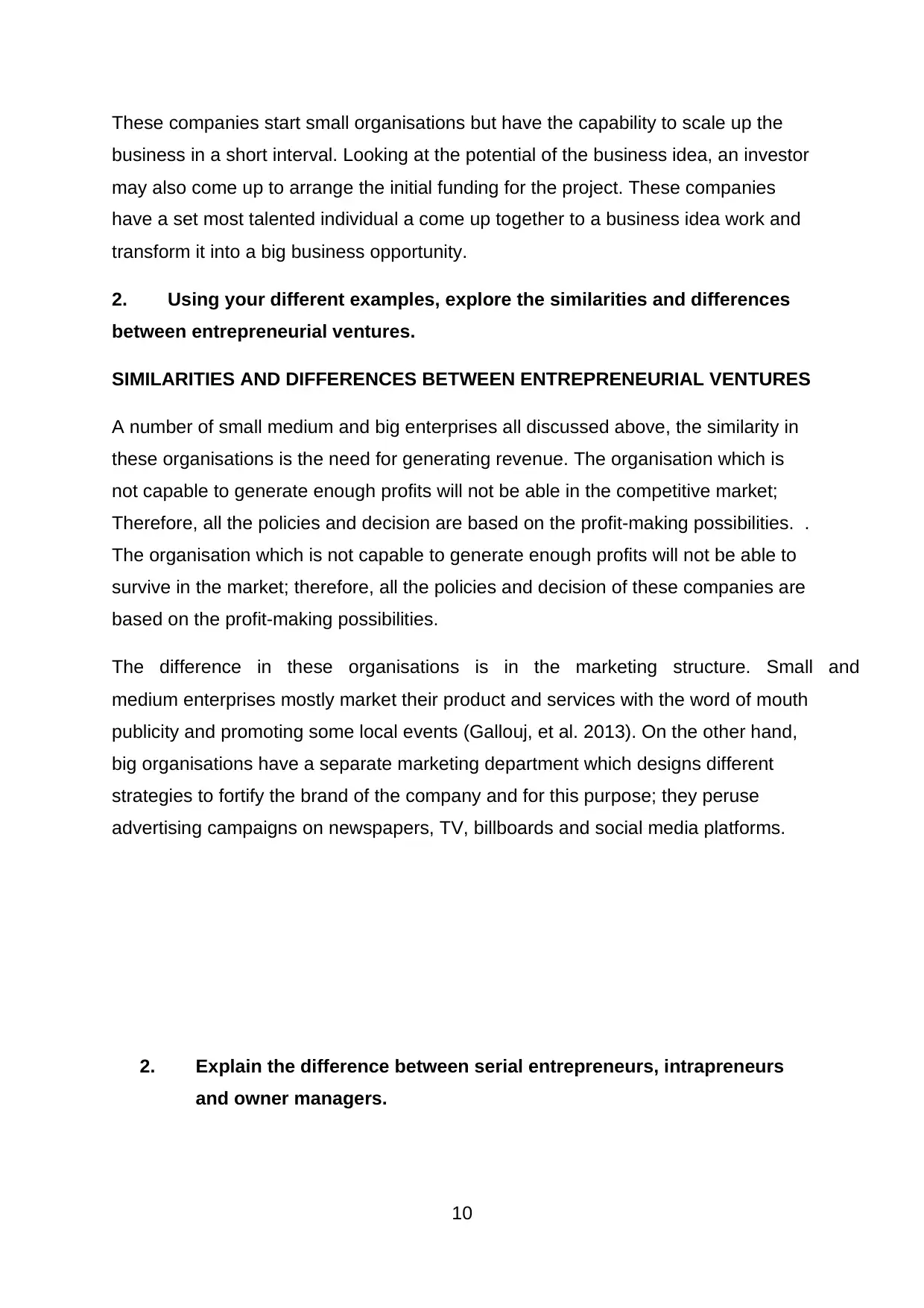
These companies start small organisations but have the capability to scale up the
business in a short interval. Looking at the potential of the business idea, an investor
may also come up to arrange the initial funding for the project. These companies
have a set most talented individual a come up together to a business idea work and
transform it into a big business opportunity.
2. Using your different examples, explore the similarities and differences
between entrepreneurial ventures.
SIMILARITIES AND DIFFERENCES BETWEEN ENTREPRENEURIAL VENTURES
A number of small medium and big enterprises all discussed above, the similarity in
these organisations is the need for generating revenue. The organisation which is
not capable to generate enough profits will not be able in the competitive market;
Therefore, all the policies and decision are based on the profit-making possibilities. .
The organisation which is not capable to generate enough profits will not be able to
survive in the market; therefore, all the policies and decision of these companies are
based on the profit-making possibilities.
The difference in these organisations is in the marketing structure. Small and
medium enterprises mostly market their product and services with the word of mouth
publicity and promoting some local events (Gallouj, et al. 2013). On the other hand,
big organisations have a separate marketing department which designs different
strategies to fortify the brand of the company and for this purpose; they peruse
advertising campaigns on newspapers, TV, billboards and social media platforms.
2. Explain the difference between serial entrepreneurs, intrapreneurs
and owner managers.
10
business in a short interval. Looking at the potential of the business idea, an investor
may also come up to arrange the initial funding for the project. These companies
have a set most talented individual a come up together to a business idea work and
transform it into a big business opportunity.
2. Using your different examples, explore the similarities and differences
between entrepreneurial ventures.
SIMILARITIES AND DIFFERENCES BETWEEN ENTREPRENEURIAL VENTURES
A number of small medium and big enterprises all discussed above, the similarity in
these organisations is the need for generating revenue. The organisation which is
not capable to generate enough profits will not be able in the competitive market;
Therefore, all the policies and decision are based on the profit-making possibilities. .
The organisation which is not capable to generate enough profits will not be able to
survive in the market; therefore, all the policies and decision of these companies are
based on the profit-making possibilities.
The difference in these organisations is in the marketing structure. Small and
medium enterprises mostly market their product and services with the word of mouth
publicity and promoting some local events (Gallouj, et al. 2013). On the other hand,
big organisations have a separate marketing department which designs different
strategies to fortify the brand of the company and for this purpose; they peruse
advertising campaigns on newspapers, TV, billboards and social media platforms.
2. Explain the difference between serial entrepreneurs, intrapreneurs
and owner managers.
10
Paraphrase This Document
Need a fresh take? Get an instant paraphrase of this document with our AI Paraphraser
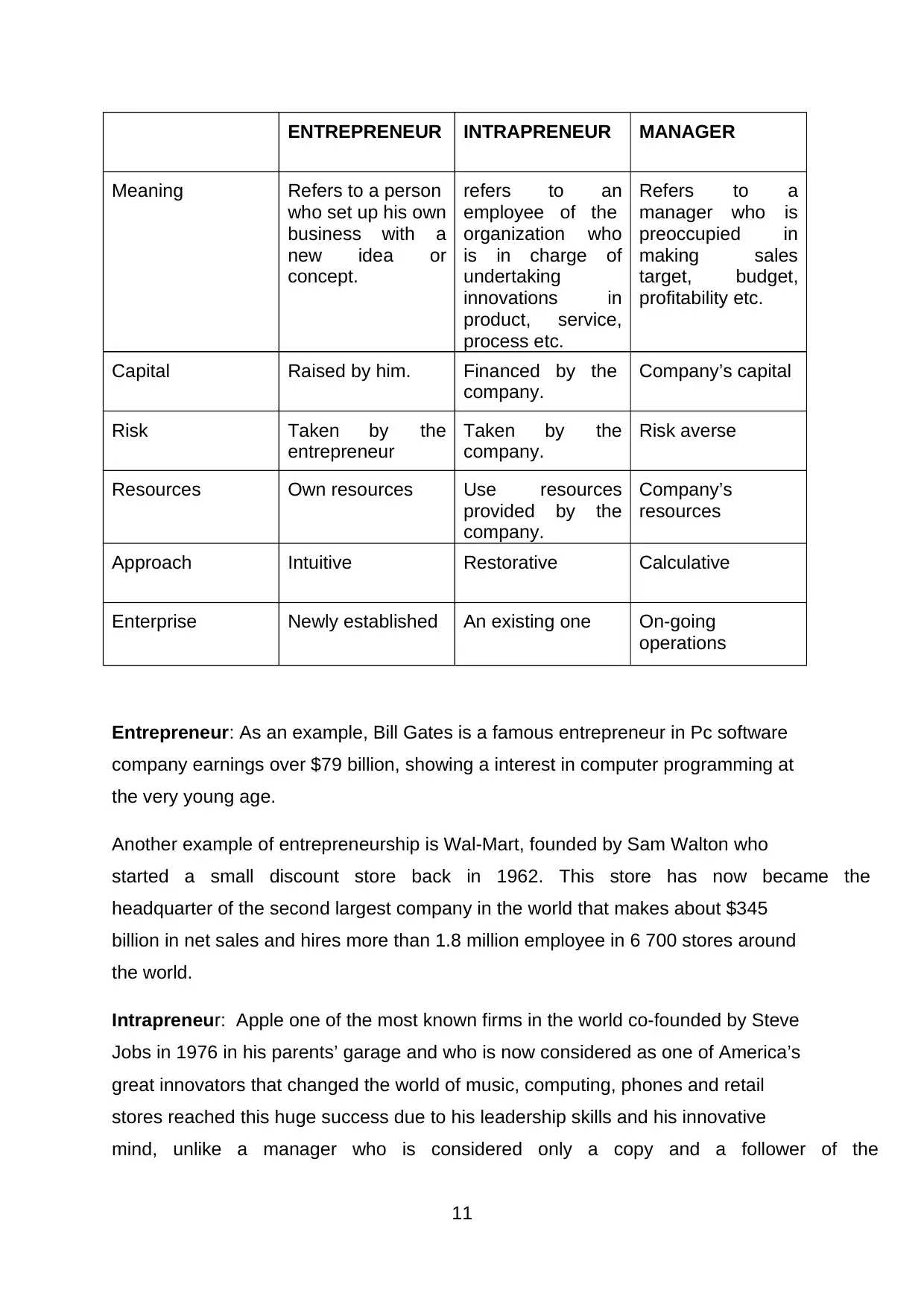
ENTREPRENEUR INTRAPRENEUR MANAGER
Meaning Refers to a person
who set up his own
business with a
new idea or
concept.
refers to an
employee of the
organization who
is in charge of
undertaking
innovations in
product, service,
process etc.
Refers to a
manager who is
preoccupied in
making sales
target, budget,
profitability etc.
Capital Raised by him. Financed by the
company.
Company’s capital
Risk Taken by the
entrepreneur
Taken by the
company.
Risk averse
Resources Own resources Use resources
provided by the
company.
Company’s
resources
Approach Intuitive Restorative Calculative
Enterprise Newly established An existing one On-going
operations
Entrepreneur: As an example, Bill Gates is a famous entrepreneur in Pc software
company earnings over $79 billion, showing a interest in computer programming at
the very young age.
Another example of entrepreneurship is Wal-Mart, founded by Sam Walton who
started a small discount store back in 1962. This store has now became the
headquarter of the second largest company in the world that makes about $345
billion in net sales and hires more than 1.8 million employee in 6 700 stores around
the world.
Intrapreneur: Apple one of the most known firms in the world co-founded by Steve
Jobs in 1976 in his parents’ garage and who is now considered as one of America’s
great innovators that changed the world of music, computing, phones and retail
stores reached this huge success due to his leadership skills and his innovative
mind, unlike a manager who is considered only a copy and a follower of the
11
Meaning Refers to a person
who set up his own
business with a
new idea or
concept.
refers to an
employee of the
organization who
is in charge of
undertaking
innovations in
product, service,
process etc.
Refers to a
manager who is
preoccupied in
making sales
target, budget,
profitability etc.
Capital Raised by him. Financed by the
company.
Company’s capital
Risk Taken by the
entrepreneur
Taken by the
company.
Risk averse
Resources Own resources Use resources
provided by the
company.
Company’s
resources
Approach Intuitive Restorative Calculative
Enterprise Newly established An existing one On-going
operations
Entrepreneur: As an example, Bill Gates is a famous entrepreneur in Pc software
company earnings over $79 billion, showing a interest in computer programming at
the very young age.
Another example of entrepreneurship is Wal-Mart, founded by Sam Walton who
started a small discount store back in 1962. This store has now became the
headquarter of the second largest company in the world that makes about $345
billion in net sales and hires more than 1.8 million employee in 6 700 stores around
the world.
Intrapreneur: Apple one of the most known firms in the world co-founded by Steve
Jobs in 1976 in his parents’ garage and who is now considered as one of America’s
great innovators that changed the world of music, computing, phones and retail
stores reached this huge success due to his leadership skills and his innovative
mind, unlike a manager who is considered only a copy and a follower of the
11
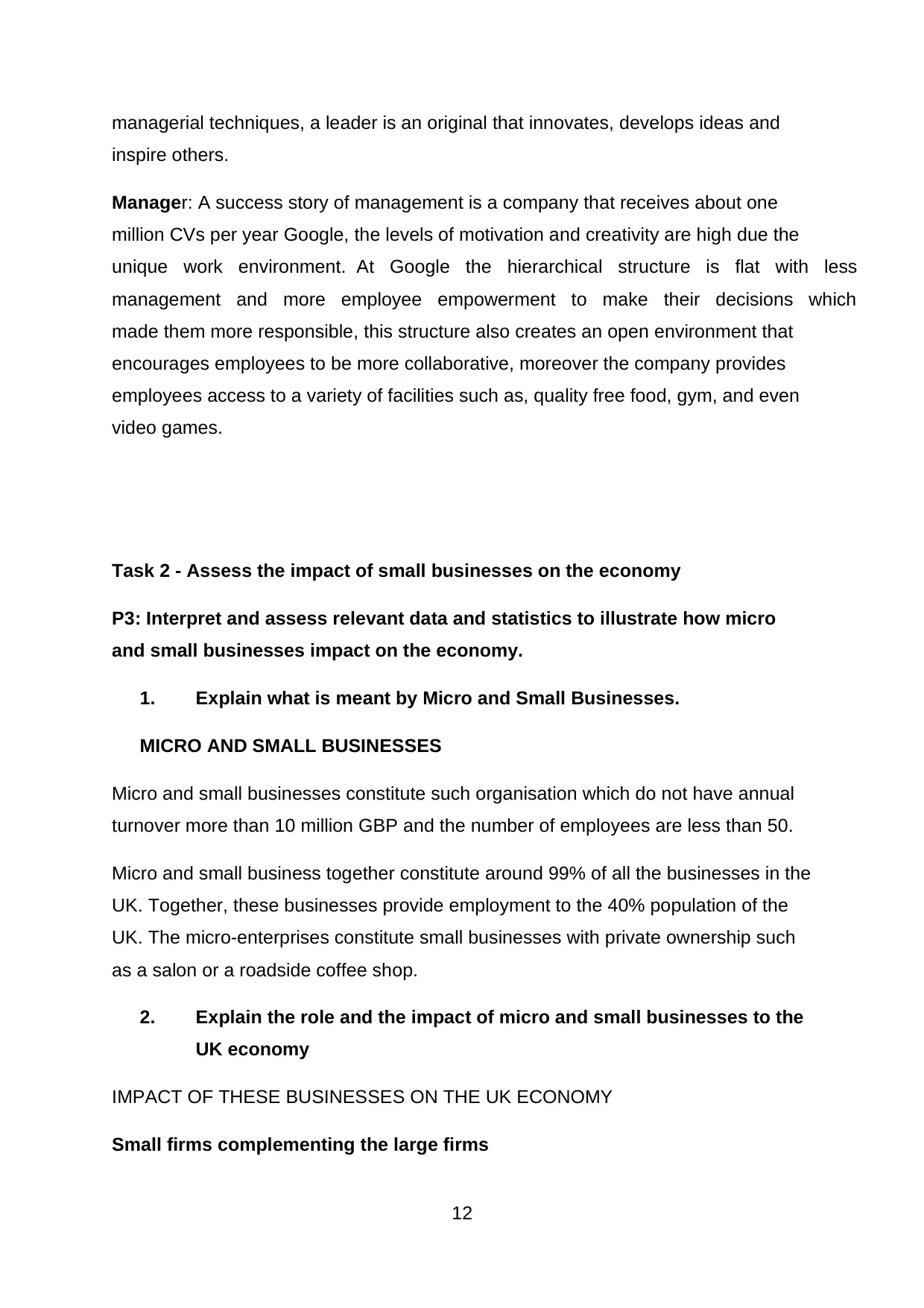
managerial techniques, a leader is an original that innovates, develops ideas and
inspire others.
Manager: A success story of management is a company that receives about one
million CVs per year Google, the levels of motivation and creativity are high due the
unique work environment. At Google the hierarchical structure is flat with less
management and more employee empowerment to make their decisions which
made them more responsible, this structure also creates an open environment that
encourages employees to be more collaborative, moreover the company provides
employees access to a variety of facilities such as, quality free food, gym, and even
video games.
Task 2 - Assess the impact of small businesses on the economy
P3: Interpret and assess relevant data and statistics to illustrate how micro
and small businesses impact on the economy.
1. Explain what is meant by Micro and Small Businesses.
MICRO AND SMALL BUSINESSES
Micro and small businesses constitute such organisation which do not have annual
turnover more than 10 million GBP and the number of employees are less than 50.
Micro and small business together constitute around 99% of all the businesses in the
UK. Together, these businesses provide employment to the 40% population of the
UK. The micro-enterprises constitute small businesses with private ownership such
as a salon or a roadside coffee shop.
2. Explain the role and the impact of micro and small businesses to the
UK economy
IMPACT OF THESE BUSINESSES ON THE UK ECONOMY
Small firms complementing the large firms
12
inspire others.
Manager: A success story of management is a company that receives about one
million CVs per year Google, the levels of motivation and creativity are high due the
unique work environment. At Google the hierarchical structure is flat with less
management and more employee empowerment to make their decisions which
made them more responsible, this structure also creates an open environment that
encourages employees to be more collaborative, moreover the company provides
employees access to a variety of facilities such as, quality free food, gym, and even
video games.
Task 2 - Assess the impact of small businesses on the economy
P3: Interpret and assess relevant data and statistics to illustrate how micro
and small businesses impact on the economy.
1. Explain what is meant by Micro and Small Businesses.
MICRO AND SMALL BUSINESSES
Micro and small businesses constitute such organisation which do not have annual
turnover more than 10 million GBP and the number of employees are less than 50.
Micro and small business together constitute around 99% of all the businesses in the
UK. Together, these businesses provide employment to the 40% population of the
UK. The micro-enterprises constitute small businesses with private ownership such
as a salon or a roadside coffee shop.
2. Explain the role and the impact of micro and small businesses to the
UK economy
IMPACT OF THESE BUSINESSES ON THE UK ECONOMY
Small firms complementing the large firms
12
⊘ This is a preview!⊘
Do you want full access?
Subscribe today to unlock all pages.

Trusted by 1+ million students worldwide
1 out of 27
Related Documents
Your All-in-One AI-Powered Toolkit for Academic Success.
+13062052269
info@desklib.com
Available 24*7 on WhatsApp / Email
![[object Object]](/_next/static/media/star-bottom.7253800d.svg)
Unlock your academic potential
Copyright © 2020–2026 A2Z Services. All Rights Reserved. Developed and managed by ZUCOL.




